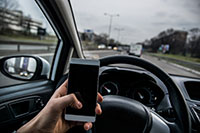Tips to Avoid Distracted Driving

Tips To Help You Focus On The Road
Nearly everyone is guilty of some form of distracted driving. In fact, distracted drivers are almost everywhere you look: the cell phone socialite, the in-car iPod DJ, the high-fashion cosmetician, the 3-course meal king or queen.
Here are some good ideas to help you drive more safely: View as PDF(715K)
- Use your cell phone for emergency situations only. While you're driving, a cell phone should only be used for emergency purposes. Even then, it's best to pull over safely to the right shoulder to make a call. Even hands-free devices can still cause you to miss important visual and audio cues needed to avoid a crash.
Social conversations on cell phones should not be carried on while driving. Remember, it's against the law in a growing number of jurisdictions. You could be ticketed and fined.
- If you are drowsy, pull off the road. Drowsiness increases the risk of a crash by nearly four times. A government study showed that 37 percent of U.S. drivers have nodded off or actually fallen asleep at least once during their driving careers. If you feel tired, get off the road; don't try to get home faster.
- You should limit the number of passengers, as well as the level of activity inside the car. Most states' graduated driver licensing laws prohibit teens from having teenage passengers in the car with them during their early months of driving solo. Driving with friends can create a dangerous driving environment because novice drivers are focused on their friends rather than the road.
- Avoid eating while driving. Being busy is no excuse for distracted driving. Finishing your breakfast on the way to work or school may seem like a time-saver, but it means you are less attentive to the drivers around you. Food spills are a major cause of distraction.
- Do your multi-tasking outside the car. Everyone spends a lot of time in their vehicles, and it may seem like the perfect time to get little things done: calling friends, searching for good music, maybe even text messaging. Don't do it. Focus on the road and the drivers around you. Get everything settled before you start driving.
Take your time driving. The entire object is to keep yourself and your passengers safe on the road.
Studies have shown that people are limited in the amount of information they can process at any one time. To accommodate the multiple demands that occur during driving, people are forced to shift their attention back and forth. Teens have even less experience behind the wheel so distractions are more costly.
Contact Us
We're here for you 24 hours a day, 7 days a week. The quickest way to contact us is through our app or online. You can also chat for immediate help.


